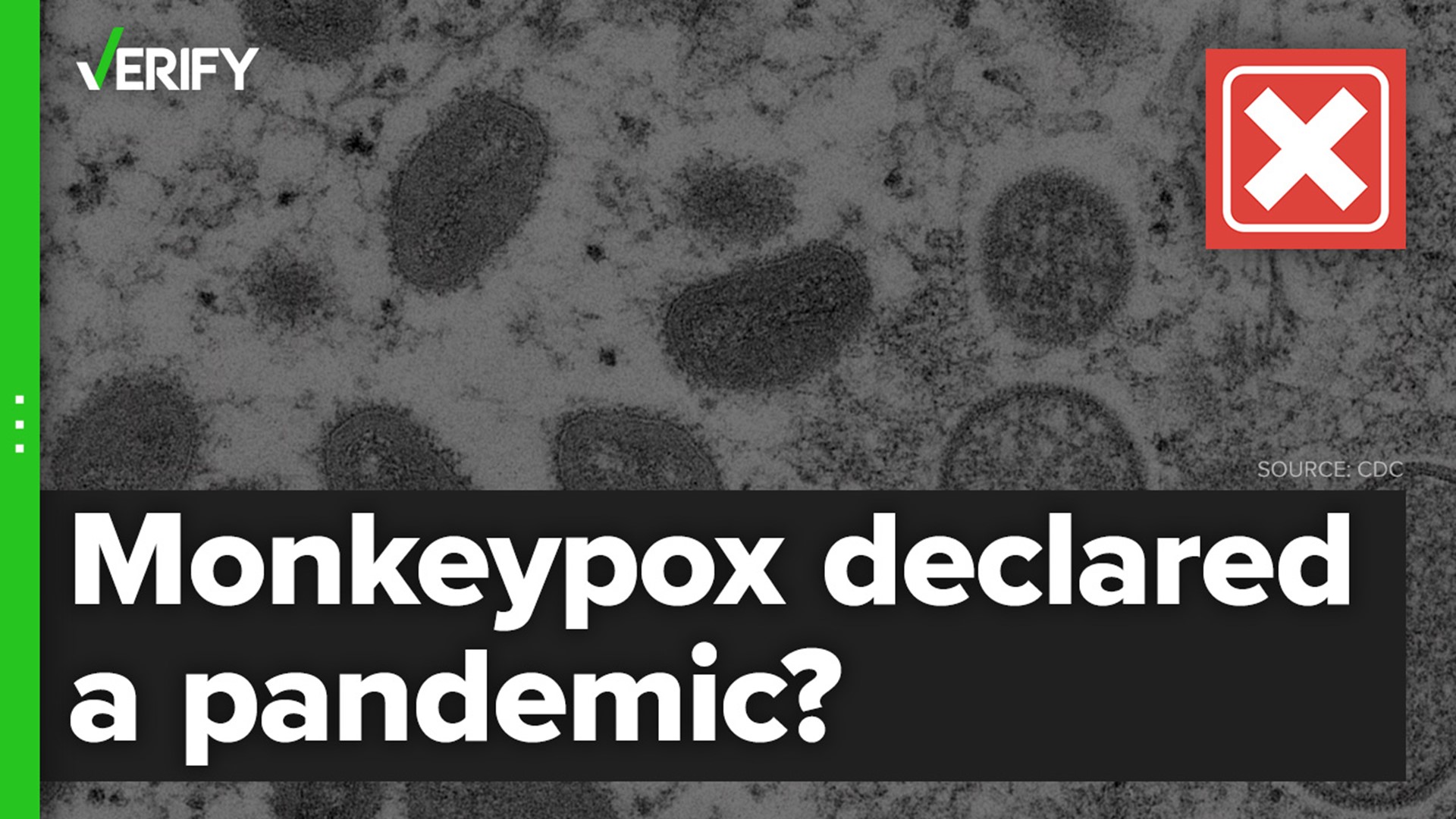More than two years ago, the World Health Organization (WHO) declared COVID-19 a pandemic.
Now, people on social media are also referring to the widespread outbreak of monkeypox, which has caused infections in the U.S. and beyond, as a pandemic.
THE QUESTION
Has the monkeypox outbreak been declared a pandemic?
THE SOURCES
- The World Health Organization (WHO)
- U.S. Centers for Disease Control and Prevention (CDC)
- The White House
- Kathryn Jacobsen, Ph.D., MPH, infectious disease epidemiologist and professor of health studies at the University of Richmond
- Columbia University’s Mailman School of Public Health
THE ANSWER
No, the monkeypox outbreak has not been declared a pandemic, but it is a global health emergency.
WHAT WE FOUND
The World Health Organization (WHO) is responsible for declaring a pandemic. Right now, the public health agency is referring to the monkeypox situation as a “multi-country monkeypox outbreak,” not a pandemic, a spokesperson told VERIFY.
The Centers for Disease Control and Prevention (CDC) and White House also refer to monkeypox as an “outbreak.”
The WHO defines a pandemic as the worldwide spread of a disease.
The CDC says a pandemic is “an epidemic that has spread over several countries or continents, usually affecting a large number of people.” An epidemic “refers to an increase, often sudden, in the number of cases of a disease above what is normally expected in that population in that area.”
An outbreak, like monkeypox, is “a higher than expected number of occurrences of a disease in a specific location and time.”
Though there isn’t specific criteria that marks the beginning or end of a pandemic, and the designation isn’t recognized under international law, there are some more general markers.
Columbia University’s Mailman School of Public Health explains that an epidemic is “generally contained or expected in its spread,” while a pandemic is “international and out of control.”
“A pandemic is defined based on how widely cases are occurring,” Kathryn Jacobsen, an infectious disease epidemiologist and professor of health studies at the University of Richmond, said. “So, at some point, there may be [monkeypox] cases that are being recorded from so many countries that this would qualify as a pandemic.”
Monkeypox was first identified by scientists in 1958, when there were two outbreaks of “pox-like” disease in research monkeys. The first human case was recorded in 1970.
The CDC says monkeypox is transmitted when a person comes into contact with an animal, human, or materials that are contaminated with the virus. Human-to-human transmission primarily occurs through close physical contact with bodily fluids, respiratory droplets, or skin lesions, the CDC and WHO say.
RELATED: 4 Fast Facts about monkeypox
A man in Massachusetts tested positive for monkeypox on May 18, 2022, becoming the first U.S. case this year, and cases have since been reported in states throughout the country.
As of July 19, there were 14,511 monkeypox cases reported worldwide, with more than 2,000 in the U.S., CDC data show. New York has reported the highest number of monkeypox cases of any U.S. state.
Though the monkeypox outbreak is not considered a pandemic, the WHO has declared it a Public Health Emergency of International Concern (PHEIC). This is the highest level of alert that the public health agency can issue.
A PHEIC is defined as “an extraordinary event which is a public health risk to countries through cross-border spread, and which requires a coordinated international response," according to the WHO spokesperson.
COVID-19 reached the level of a PHEIC about two months before it was declared a pandemic.
"WHO’s assessment is that the risk of monkeypox is moderate globally and in all regions, except in the European region where we assess the risk as high," WHO Director-General Tedros Adhanom Ghebreyesus said in a statement, adding that there is also a "clear risk of further international spread."
"So in short, we have an outbreak that has spread around the world rapidly, through new modes of transmission, about which we understand too little, and which meets the criteria in the International Health Regulations," he continued. "For all of these reasons, I have decided that the global monkeypox outbreak represents a public health emergency of international concern."
The U.S. is not yet experiencing “widespread transmission” of monkeypox among the general public, but cases are being diagnosed in more groups of people, including women and populations outside of urban centers, Jacobsen said.
So far, the virus has predominantly spread among men who have sex with men, but anyone can contract the disease through close contact.
“The expectation is over the next few weeks, we will start to see diagnoses in more states [and] more cities within various states,” Jacobsen said. “At that point, this would certainly be considered a widespread epidemic. So we're seeing a series of epidemics in cities right now that could become a widespread American epidemic.”
The increase in U.S. monkeypox case counts is in large part due to increased access to testing, Jacobsen added.
If monkeypox is eventually declared a pandemic, it won’t be “anything like the scale that we’re seeing for COVID” due to several factors, including how the viruses spread, Jacobsen added.
“Coronavirus spreads through the air, so it's really easy for that to spread into crowds because it goes through the air system. …In very close proximity, it is possible for [monkeypox] to spread without touch,” she said. “But it does not appear to be something that aerosolizes or spreads widely through the air. It's mostly skin-to-skin contact, which means that it isn't going to spread nearly as fast as coronavirus spread.”
Monkeypox also currently infects fewer people for each person who is diagnosed than COVID-19, according to Jacobsen.

